(August 6, 2008)
Correspondent Mike D., who has been working in China for the past five years,
recently nailed an issue which is absolutely critical but which strangely
receives virtually no attention: the Empire of Debt is entirely dependent on an
Empire of Lies.
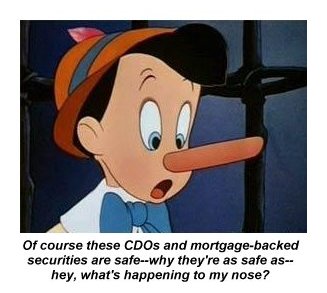 We all know this. Commentators from Mish to Karl Denninger to John Williams to Nouriel Roubini to
David Rosenberg to Richard Russell and many others have noted (and dissected)
the preponderance of outright lies, obfuscatory half-truths and prevarications
in virtually every nook and cranny of the U.S. financial system, including:
We all know this. Commentators from Mish to Karl Denninger to John Williams to Nouriel Roubini to
David Rosenberg to Richard Russell and many others have noted (and dissected)
the preponderance of outright lies, obfuscatory half-truths and prevarications
in virtually every nook and cranny of the U.S. financial system, including:
1. unemployment/birth-death model
2. CPI/consumer and producer price indices
3. assets (and losses) held off balance sheet
4. assets marked to model rather than to market
5. earnings manipulated by accounting legerdemain
6. distressed/defaulted mortgages and loans masked or hidden away
7. so-called "leaders" stating again and again that no capital infusions
will be needed, and then raising capital days or weeks later
8. government officials and others understating the losses
9. government officials declaring the "crisis" over even as it picks up momentum
10. government officials bailing out lenders and investors under the guise of
"helping homeowners"
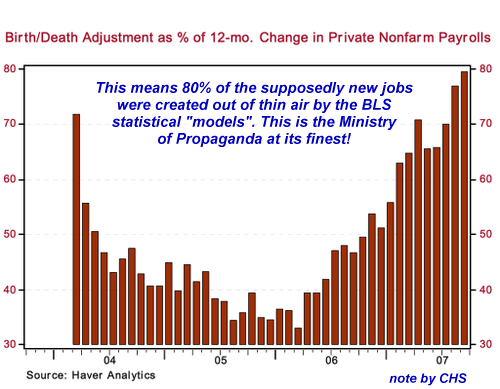
I could go on but I would tire of typing even a partial list of all the outright lies
which have been foisted on us. It is truly remarkable how the
sychophants in the MSM and financial media accept each lie as if there were no
history of blatant, achingly obvious lies spewing from the same mouths just weeks ago.
The issues are: when do all the lies erode trust in the vaunted U.S. financial
system? And, if this trust hasn't already been utterly destroyed, why not?
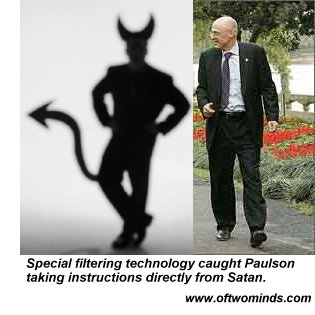
For such a supposedly religious nation, the lies have drawn remarkably little
moral outrage or even comment in the U.S. Just "business as usual," eh?
The reason is also
obvious: many are complicit in the hope that the endless repetition of
blatant lies will somehow
"save" them.
"Save" the U.S. homeowners and lenders from declining housing values
"Save" the Asian and EU exporters from an imploding market for their goods
"Save" the speculators and investors, overseas and U.S. alike, from the
stupendous losses which an honest accounting would reveal in all U.S. mortgage,
loan and derivative markets
"Save" U.S. politicos and regulators, keepers of the public trust, from
having to accept the blame for aiding and abetting the fraud, lax oversight and
phony accounting that have gutted
the U.S. financial system and left the taxpayers to clean up the mess
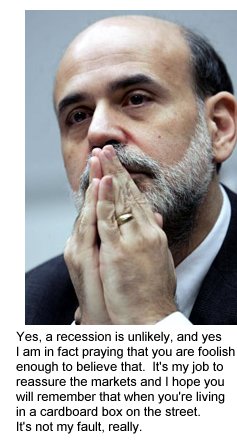 It's not politicially correct to issue any moral judgments on anything or anyone
in today's U.S. of A. (you might hurt somebody's feelings, poor things), but
again I am stating the obvious that if there was any justice on this planet then
the U.S. financial system would be reduced to a smoking ruin, and the foundation of
a truly trustworthy, transparent system built on its warm ashes.
It's not politicially correct to issue any moral judgments on anything or anyone
in today's U.S. of A. (you might hurt somebody's feelings, poor things), but
again I am stating the obvious that if there was any justice on this planet then
the U.S. financial system would be reduced to a smoking ruin, and the foundation of
a truly trustworthy, transparent system built on its warm ashes.
Here are Mike's comments:
I'm sure you know about the Merrill Lynch sale of CDO's at 22c/$ which is really a
sale at 5.5 cents on the dollar. Nouriel Roubini explains it very succinctly on his
website. Charles, I am a Canadian Chartered Accountant, equivalent to a CPA in
America. I honestly don't understand America's GAAP (generally accepted accounting
principles) anymore. This sale should clearly be valued at 5.5, not at 22. I am
also somewhat quizzical of the reported off-balance sheet holdings of derivatives
by the big dogs Citibank, Wamu, etc. If these holdings are in any way guaranteed
by the parent, they represent a liability of the parent (Accounting 101).
I'd like to share a couple of quotes:
"The smart and very savvy Mohamed El-Erian (co-CEO of Pimco) put it in polite
terms when he recently said while commenting on this financial crisis: “What has
suffered most is the credibility of the most sophisticated financial systems in
the world." Or as Bill King (a senior financial analyst) put it: "Eventually a
critical mass of investors and traders will become cognizant of the obvious
scheme and distrust of financial firms’ results, guidance and motives will
increase substantially. John Thain’s (Chairman and CEO of Merrill) credibility
is now an issue. It is both the credibility and viability of the most
sophisticated financial system that is at stake now as most of this financial
and banking system is on its way to substantial and formal insolvency and bankruptcy."
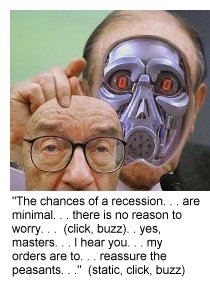 The reason New York is the center of the financial world is to a large degree a
result of the purported "transparency" of the American system. (Emphasis added by CHS)
The Asian markets
(especially Shanghai) are opaque to a greater or lesser degree. But, with these
latest machinations, I am wondering when and if, the investors of the world will
get fed up and move New York somewhere else where there is some control and
financial data can be trusted.
The reason New York is the center of the financial world is to a large degree a
result of the purported "transparency" of the American system. (Emphasis added by CHS)
The Asian markets
(especially Shanghai) are opaque to a greater or lesser degree. But, with these
latest machinations, I am wondering when and if, the investors of the world will
get fed up and move New York somewhere else where there is some control and
financial data can be trusted.
What effect do you think such a move would have on the US economy if the NYSE
and NASDAQ were to become virtual backwaters in the global economic system and
do you think this is possible?
I include Roubini's take on the Merrill con below.
Excellent question, Mike. I hope it's possible, but that would require investors
who aren't dependent on fraud for their own profits. I am not an accountant, but I have read as widely as
possible about Asian banks, especially Japanese and Chinese banks. Unfortunately,
it seems that hiding impaired assets is rampant in Asian banks as well. The pan-Asian
system seems designed to provide a "face" of compliance and rigor which is basically
a facade hiding distressed/non-performing loans which must be masked for political
reasons (the borrowers are state-owned, "too big to fail," etc.)
In other words, the same flaws seem to be present in Asian banking as well, though
perhaps Singapore, famously rule-of-law, has the systemic courage and rigor to
be truly transparent. Sadly, rule-of-law in the U.S. means "with these exceptions:"
too big to fail, Fannie Mae gave me thousands on campaign contributions, I need to
bail out my banking buddies, etc.
London certainly has taken the mantle of global banking center, but it remains to be
seen if U.K. banking is any less impaired, obfuscatory and riddled with
phony accounting than the U.S. Are U.K. banks just as insolvent as U.S. banks?
As U.K. property values implode, they soon may be insolvent if they are not yet so.
We should also draw a distinction here between merchant banks, mortgage lenders and investment
banks. Though everyone is getting into everyone else's business, investment banks
and mortgage lenders generated much of the fraud which has now undermined the
entire system. Banks which restricted themselves to lending to legitimate businesses
(if any such lending institutions still exist) would have little to
hide unless they'd foolishly loaded up their own balance sheets with credit swaps,
CDOs, etc.
But as a financial entity, clearly the U.S. financial system deserves zero
trust from anyone--most especially the dazed taxpayers who have been saddled with
the rescue of the speculators and criminals who profited so immensely from the
frauds, lies and phony accounting which has become "root" (a nod to Unix fans)
to the entire system.
Put directly: could the U.S. financial system survive if strictly honest accounting and
transparency were imposed tomorrow? We all know the answer is "no."
Some observers like John Mauldin has suggested that the obfuscations and phony
accounting have to be tolerated for a few years so the system can "rebuild" itself.
This is akin to allowing the coach of a drug-riddled, scandal-torn team a free hand to keep
hiring more steroid-pumped freaks-of-nature "athletes" while he "rebuilds" the team.
So once you're caught
lying, cheating, stealing, etc., then we have to allow you to keep lying,
cheating and stealing until you've "rebuilt" your corrupt team? Exactly how can
corruption and fraudulent accounting be "fixed" by enabling years more of the same
chicanry?
Even worse, now that the U.S. financial sector has squandered trillions in outright gambling
and fraud, now we the taxpayers are being tapped to bail out the perps and speculators.
What lesson is being taught here? Just this: if the con is monumental enough
to threaten the "system", then you will not just go scott-free, you will be rewarded
and recapitalized to enable you to go out and gamble another couple trillion
for your own private gain--at taxpayer expense. Hey, pretty sweet. Sign me
up!
Risk has been shifted to the taxpayers, while the perpetrators of this era of
stupendous fraud, accounting legerdemain and betrayal are being rewarded with new
capital to play with after the furor dies down.
The only possible brake on this madness is the bond market. But if non-U.S.
players continue to buy up any and all U.S. debt to the tune of $60+ billion a month,
without any demands for transparency or a rate of return that isn't less than inflation,
then they are insuring a cataclysmic collapse when the losses finally outweigh
their need to prop up the Empire of Debt and the Empire of Lies it depends on for
its very existence.
In summary: an enormous opportunity awaits any nation with sufficient respect
for strict accounting and rule-of-law (and some fiber-optics lines) to take away
legitimate business from New York, London, Tokyo, Shanghai, et al. The players
whose very existence depends on perpetrating lies and fraud will of course remain
in New York to serve those with the same agenda, i.e. defrauding people via
financial and accounting trickery.
For those who may have missed Roubini's dismantling of Merrill Stench's
smelly pile of lies and purposefully misleading accounting, here it is:
Nouriel Roubini, July 29, 2008:
Super-Senior Tranches of CDOs are Worth Much Less than 22 Cents on the Dollar:
Another Ponzi Scheme of “Selling” Toxic Garbage with More Leverage
Merrill Lynch decision to “sell” a good chunk of its remaining CDOs at 22 cents
to the dollar has been widely praised as the firm finally recognizing the full
extent of its losses on these toxic instruments. This batch of $30.6 billion of
CDOs was already marked down to $11.1 billion. Now with the “sale” of it to Lone
Star at a price of 6.7 billion Merrill Lynch is taking another $4.4 billion
writedown and “selling” it at 22% of the original face value.
But is this a market-based “sale”? No way as calling this transaction a “sale”
is a joke.
Let me explain next why…
First, note that the secondary market for CDOs is now extremely illiquid and
Merrill will provide financing for 75% of the purchase price, or a financing
of $5.055 billion. That implies that these CDOs are worth much less than 22
cents of the dollar. These type of “sales” transactions – broker dealers “selling”
their toxic waste at a discount and providing hedge funds and private equity
funds with heavily subsidized financing for it – has going on for a while.
That discounted “sale” price often ends up being much higher than the true value
of the assets (and the ensuing writedown of the assets is smaller than the
correct one) because of three reasons:
the selling broker dealer is providing most of the financing for the transaction
as this market is totally illiquid and no one could dump $11.1 billions of toxic
and illiquid CDOs in such a market;
the interest rate at which the financing occurs is often significantly lower
than the appropriate rate at which this risk financing will occur. Merrill has
not announced what are the terms of its financing of this deal and this leaves
the serious suspicion of a heavily subsidized transaction;
the collateral for this risky financing is the same toxic waste that was sold
to a fund. In the case of the Merrill transaction if the market value of this
$11.1 tranche (now priced at $6.7 billion) falls another 25% the collateral for
the 75% financing (that is non-recourse as it is secured only by the collateral)
will be worth less than the underlying assets and thus additional losses
will be incurred by Merrill.
In other terms, as pointed out by Bloomberg since “the financing is secured only
by the assets being sold, meaning Merrill would absorb any losses on the CDOs
beyond $1.68 billion”. Thus, in a extreme scenario in which the CDOs actually
end up being worth zero Merrill will end up having sold them to Lone Star for
5.5 cents on the dollar rather than 22 cents. I.e. leaving aside the first
loss of 25% taken by Lone Star all of the remaining credit loss is borne by
Merrill.
So, based on the above consideration, is this toxic junk worth 22 cents on the
dollar? No way and one would have to assume that the true market value of this
garbage is closer to zero than 22 cents. So the street is now arguing that
22 cents on the dollar sets a market benchmark for writing down CDOs (Citi is
still carrying them at a value of 53 cents rather than the 22) and many
other firms will now have to use this benchmark; but the reality is that
this toxic garbage is worth much less than 22 cents. So the charade of
pretending to mark down to market the value of this junk will continue for
a few quarters with continued bleeding of earnings.
At this point it would be more honest for the financial firms to write down
to zero the value of these assets (with possible positive revaluation if they
turn out being worth more than zero) and keep them on balance sheet rather
than pretending to “sell” them via greater debt that massively adds to the
credit risk that these firms are taking at the time when they should be
deleveraging rather than releveraging further.
What is the sense of taking on another $5 billion of risky debt that has
toxic garbage as collateral? Is this sound financial balance sheet restructuring
or another Ponzi scheme of a house of debt-upon-debt cards? Selling worthless
junk and providing financing for it is not a “sale”; it is another accounting
scam whose purpose is hiding the full extent of the losses on garbage, not
coming clean on them. So beware of the cheerleading chorus of banking “analysts”
praising Merrill and this transaction.
The entire episode stinks with the
Merrill CEO making a series of misleading statements on Q2 earnings and on
no need for further capital and now coming out of the blue with this new
surprise and a new large capital injection that will massively dilute current
shareholders a few days after the dismal Q2 results were reported. Add to
this charade the fact that what will be raised in this new round of
recapitalization will be much less than the announced $8.5 billion once
Temasek and other shareholders who participated in the previous recap will
be compensated for the massive losses they incurred in that round of
recapitalization of Merrill.
Four New stimulating Readers Journal Essays:
Plus
two new readers' poems
The Self-Selected Remnant
(Chris Sullins, August 4, 2008)
One of the very few simple Arabic phrases I bothered to learn in Iraq was "I am a
doctor." If I was captured despite my best efforts to die in a blaze of glory,
I thought the phrase might buy me some time. Although it was not quite an accurate
description of my actual military occupational specialty it sounded better and a
lot shorter than "I am a licensed master of force multiplication and controlling
angry combat."
The Carp Culture
(Rene Andre, August 4, 2008)
I am just an average joe schmoe who is trying to suck up an existance from the detritus
and flotsam cast off by the Cream of Society. I know it, and so do you, that Americans
are a wasteful bunch, who'd rather buy new than repair. They're trendy and competitive
as well, so they have to have the newest latest gadget or toy so that they can
continue to put on airs as the creme de la creme of society.
Enter the bottom feeders. I am not ashamed to claim that moniker. I have always
been a scrounger and a trash can entrepreneur.
Energy and the Balance of Power
(Mark A. Ancona, August 4, 2008)
The United States is losing global hegemony. This is an uncomfortable, yet
immutable truth, now repeated by an increasing number of powerful industry leaders
and government officials. Having bankrupted our Nation with an un-winnable war,
public bail-out of private investment bankers and Alan Greenspan’s nuclear housing
bubble, we can no longer afford to engage in the frivolous waste of oil and natural
resources. Many countries are coming of age with the re-discovery of their valuable
natural resources. Previously third world nations are building first world
infrastructures and economies with their new-found bounty.
Astounding Facts of Hidden History
(R. Christoffersen, August 4, 2008)
Things They Didn’t Tell You in History Class
Readers Journal essays express the views of the essays' writers and do not
necessarily reflect the views of CHS. I post essays with a variety of views
in order to stimulate our collective critical thinking. I have long posted
essays which run counter to my own views because I could be wrong--and often
have been.
NOTE: contributions are acknowledged in the order received. Your name and email
remain confidential and will not be given to any other individual, company or agency.
Thank you, Karl H. ($15), for your very generous donation
to this site.
I am greatly honored by your support and readership.
For more on this subject and a wide array of other topics, please visit
my weblog.
All content, HTML coding, format design, design elements and images copyright ©
2008 Charles Hugh Smith, All rights
reserved in all media, unless otherwise credited or noted.
I would be honored if you linked this wEssay to your site, or printed a copy for your own use.

